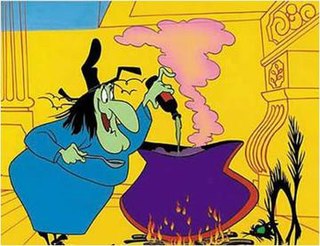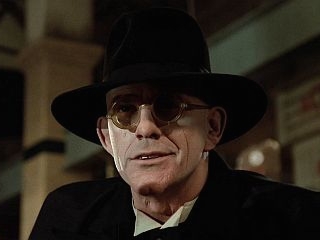
Who Framed Roger Rabbit is a 1988 American fantasy comedy film directed by Robert Zemeckis from a screenplay written by Jeffrey Price and Peter S. Seaman. It is loosely based on the 1981 novel Who Censored Roger Rabbit? by Gary K. Wolf. The film stars Bob Hoskins, Christopher Lloyd, Stubby Kaye, Joanna Cassidy, and the voices of Charles Fleischer and an uncredited Kathleen Turner. Combining live-action and animation, the film is set in an alternate history Hollywood in 1947, where humans and cartoon characters co-exist. Its plot follows Eddie Valiant, a private investigator with a grudge against toons, who must help exonerate Roger Rabbit, a toon framed for murder.

Mary Kathleen Turner is an American actress. Known for her distinctive husky voice, she is the recipient of two Golden Globes, as well as nominations for an Academy Award, a Grammy, and two Tony Awards.

Witch Hazel is an animated cartoon character in the Warner Bros. Looney Tunes and Merrie Melodies series of cartoons and TV shows. Witch Hazel is a fairy tale witch antagonist with green skin, a round figure, bulbous facial features, and a single tooth. The name is a pun on the witch-hazel plant and folk remedies based on it.

Who Censored Roger Rabbit? is a fantasy mystery novel written by Gary K. Wolf in 1981. It was later adapted by Disney and Amblin Entertainment into the critically acclaimed 1988 film Who Framed Roger Rabbit.

Petunia Pig is an animated cartoon character in the Looney Tunes and Merrie Melodies series of cartoons from Warner Bros. She looks much like her significant other, Porky Pig, except that she wears a dress and has pigtailed black hair.

Romancing the Stone is a 1984 action adventure romantic comedy film directed by Robert Zemeckis, written by Diane Thomas and produced by Michael Douglas, who also stars in the film alongside Kathleen Turner and Danny DeVito. The film follows a romance novelist who must venture beyond her New York City comfort zone to Colombia in order to save her sister from criminals who are holding her for ransom.

Amblin Entertainment, Inc., formerly named Amblin Productions and Steven Spielberg Productions, is an American film production company founded by director and producer Steven Spielberg, and film producers Kathleen Kennedy and Frank Marshall in 1980. Its headquarters are located in Bungalow 477 of the Universal Studios backlot in Universal City, California. It distributes all of the films from Amblin Partners under the Amblin Entertainment banner.

Gerald Jinx "Jerry" Mouse is a fictional character and one of the two titular characters in Metro-Goldwyn-Mayer's series of Tom and Jerry theatrical animated short films and other animated media, usually acting as the protagonist opposite his rival Tom Cat. Created by William Hanna and Joseph Barbera, Jerry is an anthropomorphic brown house mouse, who first appeared as a mouse named Jinx in the 1940 MGM animated short Puss Gets the Boot. Hanna gave the mouse's original name as "Jinx", while Barbera claimed the mouse went unnamed in his first appearance.

Judge Doom is a fictional character and the main antagonist in the 1988 film Who Framed Roger Rabbit, portrayed by Christopher Lloyd. He is depicted as the much-feared, cruel, and evil judge of Toontown, who later in the film is revealed as the mastermind behind the framing of the titular character and the murder of protagonist Eddie Valiant's brother.
Gary K. Wolf is an American author. He is best known as the author of Who Censored Roger Rabbit? (1981), which was adapted into the hit feature-length film Who Framed Roger Rabbit (1988).

Robert Ralph Minkoff is an American director, animator, and producer. He is best known for co-directing The Lion King, and live-action films including Stuart Little (1999), Stuart Little 2 (2002), The Haunted Mansion (2003), and The Forbidden Kingdom (2008). In recent decades, he returned to feature animation with Mr. Peabody & Sherman (2014) and Paws of Fury: The Legend of Hank (2022). His wife, Crystal Kung Minkoff, was a cast member on The Real Housewives of Beverly Hills.

ImageMovers (IM), is an American production company which produces CGI animation, motion-capture, live-action films and television shows. The company is known for producing such films as Cast Away (2000), What Lies Beneath (2000), The Polar Express (2004), Monster House (2006), and Beowulf (2007). From 2007 to 2011, The Walt Disney Company and ImageMovers founded a joint venture animation facility known as ImageMovers Digital which produced two motion-captured CGI-animated films: A Christmas Carol (2009) and Mars Needs Moms (2011) for Walt Disney Pictures, neither of which were financially successful.

Roger Rabbit's Car Toon Spin is a dark ride located at the Disneyland and Tokyo Disneyland theme parks, based on the 1988 Disney/Amblin film Who Framed Roger Rabbit. Both versions of the attraction are located in Mickey's Toontown. The Disneyland version opened on January 26, 1994, a year after the Mickey's Toontown area opened, and the Tokyo Disneyland version opened on April 15, 1996. In December 2021, the Disneyland version was updated to include a new plot element of Jessica Rabbit in the role of a detective who is determined to stop a crime wave in Toontown.

Who Framed Roger Rabbit is a media franchise owned by The Walt Disney Company and Amblin Entertainment, that began with the 1988 film, Who Framed Roger Rabbit, itself based on a book titled Who Censored Roger Rabbit? by Gary K. Wolf.

Smile, Darn Ya, Smile! is a 1931 Warner Bros. Merrie Melodies cartoon short directed by Rudolf Ising. The short was released on September 5, 1931, and features Foxy, an early Merrie Melodies star.
Roger Rabbit is the title character in the fantasy comedy film, Who Framed Roger Rabbit (1988), directed by Robert Zemeckis.
The Roger Rabbit shorts are a series of three animated short films produced by Walt Disney Feature Animation from 1989 to 1993. They feature Roger Rabbit, the animated protagonist from Who Framed Roger Rabbit (1988), being enlisted the task of caring for Baby Herman while his mother is absent, resulting in a plot defined by slapstick humor and visual gags. Each short concludes with a sequence involving live-action and animation, where the characters interact with live-action human beings, akin to the 1988 film. Droopy Dog from MGM makes a cameo in all of the shorts.

Roger Rabbit is a fictional animated anthropomorphic rabbit, who first appeared in author Gary K. Wolf's 1981 novel, Who Censored Roger Rabbit? In the book, Roger is second banana in a popular comic strip, "Baby Herman". Roger hires private detective Eddie Valiant to investigate why his employers, the DeGreasy Brothers, have reneged on their promise to give Roger his own strip. When Roger is found murdered in his home, Valiant sets out to look for the killer, with the help of Roger's "doppel".
Events in 1953 in animation.

Chip 'n Dale: Rescue Rangers is a 2022 American live-action/animated adventure comedy film based on the characters Chip and Dale and loosely based on the 1989 animated TV series of the same name, excluding the duo's previous filmography. Directed by Akiva Schaffer and written by Dan Gregor and Doug Mand, the film stars John Mulaney and Andy Samberg as the voices of the eponymous pair, respectively, with KiKi Layne, Will Arnett, Eric Bana, Flula Borg, Dennis Haysbert, Keegan-Michael Key, Tress MacNeille, Tim Robinson, Seth Rogen, and J.K. Simmons. Walt Disney Pictures co-produced the film in association with The Lonely Island and David Hoberman and Todd Lieberman's Mandeville Films.
















